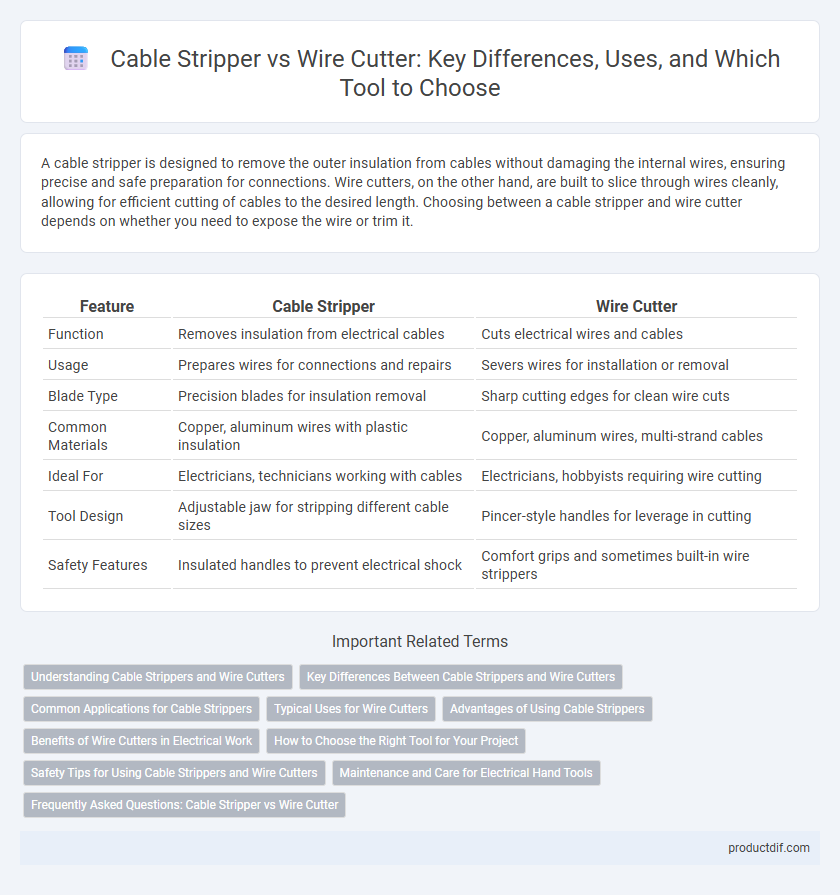A cable stripper is designed to remove the outer insulation from cables without damaging the internal wires, ensuring precise and safe preparation for connections. Wire cutters, on the other hand, are built to slice through wires cleanly, allowing for efficient cutting of cables to the desired length. Choosing between a cable stripper and wire cutter depends on whether you need to expose the wire or trim it.
Table of Comparison
| Feature | Cable Stripper | Wire Cutter |
|---|---|---|
| Function | Removes insulation from electrical cables | Cuts electrical wires and cables |
| Usage | Prepares wires for connections and repairs | Severs wires for installation or removal |
| Blade Type | Precision blades for insulation removal | Sharp cutting edges for clean wire cuts |
| Common Materials | Copper, aluminum wires with plastic insulation | Copper, aluminum wires, multi-strand cables |
| Ideal For | Electricians, technicians working with cables | Electricians, hobbyists requiring wire cutting |
| Tool Design | Adjustable jaw for stripping different cable sizes | Pincer-style handles for leverage in cutting |
| Safety Features | Insulated handles to prevent electrical shock | Comfort grips and sometimes built-in wire strippers |
Understanding Cable Strippers and Wire Cutters
Cable strippers are specialized tools designed to remove the outer insulation from electrical cables without damaging the inner conductors, ensuring precise and safe stripping for various wire gauges. Wire cutters, also known as diagonal pliers or side cutters, are primarily used for cutting wires cleanly and efficiently at different thicknesses, often incorporating hardened steel blades for durability. Understanding the specific function and design of cable strippers and wire cutters helps professionals select the right tool for tasks involving cable preparation and electrical wiring maintenance.
Key Differences Between Cable Strippers and Wire Cutters
Cable strippers are specifically designed to remove insulation from electrical wires without damaging the conductive core, featuring adjustable blades for precision. Wire cutters, on the other hand, are intended to cut through wires and cables cleanly, often with hardened steel blades for durability. Understanding the key differences between these tools ensures efficient handling of electrical tasks, preventing wire damage and improving safety.
Common Applications for Cable Strippers
Cable strippers are commonly used for removing insulation from electrical wires to prepare them for connection or splicing, making them essential in electrical installation and maintenance. They are ideal for working with various cable types such as coaxial, multi-conductor, and fiber optic cables, enabling precise insulation removal without damaging the conductors. Electricians and technicians often rely on cable strippers for tasks like residential wiring, automotive repairs, and telecommunications setups.
Typical Uses for Wire Cutters
Wire cutters are typically used for cutting electrical wires, trimming cables, and removing insulation in electronics and electrical work. They are essential for tasks requiring precise wire length adjustment and clean cuts to ensure safe and effective connections. Wire cutters come in various sizes and types, optimized for cutting different gauges of wire, including copper, aluminum, and steel.
Advantages of Using Cable Strippers
Cable strippers offer precise insulation removal without damaging the underlying conductor, ensuring cleaner and safer connections. Their design allows for adjustable stripping depths, making them versatile for various cable sizes and types. Compared to wire cutters, cable strippers reduce wire damage and increase efficiency in preparing cables for electrical work.
Benefits of Wire Cutters in Electrical Work
Wire cutters provide precise and clean cuts essential for efficient electrical work, reducing the risk of damaging conductors and ensuring reliable connections. Their ergonomic design enhances safety and control, minimizing hand fatigue during repetitive tasks. Using wire cutters increases productivity by enabling quick and accurate wire preparation, crucial for both residential and industrial electrical installations.
How to Choose the Right Tool for Your Project
Selecting the right tool between a cable stripper and a wire cutter depends on the specific requirements of your electrical project, such as the type and thickness of the wire involved. Cable strippers are optimized for safely removing insulation without damaging the conductor, while wire cutters are designed to cleanly cut through wires of varying gauges. Evaluating the wire size, insulation type, and whether you need to strip or cut will ensure efficient and precise tool selection for optimal results.
Safety Tips for Using Cable Strippers and Wire Cutters
When using cable strippers and wire cutters, always wear protective gloves and safety goggles to prevent injury from sharp edges and flying debris. Ensure tools have insulated handles to reduce the risk of electrical shock, especially when working with live wires. Maintain proper tool condition by regularly inspecting blades for dullness or damage, which can compromise safety and efficiency.
Maintenance and Care for Electrical Hand Tools
Proper maintenance and care for cable strippers and wire cutters significantly extend tool lifespan and ensure reliable performance. Regular cleaning after use prevents residue buildup that can dull cutting edges or impair stripping precision, while routine lubrication of pivot points reduces friction and wear. Periodic inspection for damage or misalignment helps maintain safety and cutting accuracy, making it essential to replace worn blades or parts promptly.
Frequently Asked Questions: Cable Stripper vs Wire Cutter
A cable stripper is designed to remove the outer insulation of cables without damaging the internal wires, ensuring clean and precise stripping for electrical work. Wire cutters are primarily used to cut wires or cables to the desired length, providing clean cuts through various wire gauges. Choosing between a cable stripper and a wire cutter depends on the task--stripping insulation requires a cable stripper, while cutting wires calls for wire cutters.
Cable Stripper vs Wire Cutter Infographic

 productdif.com
productdif.com